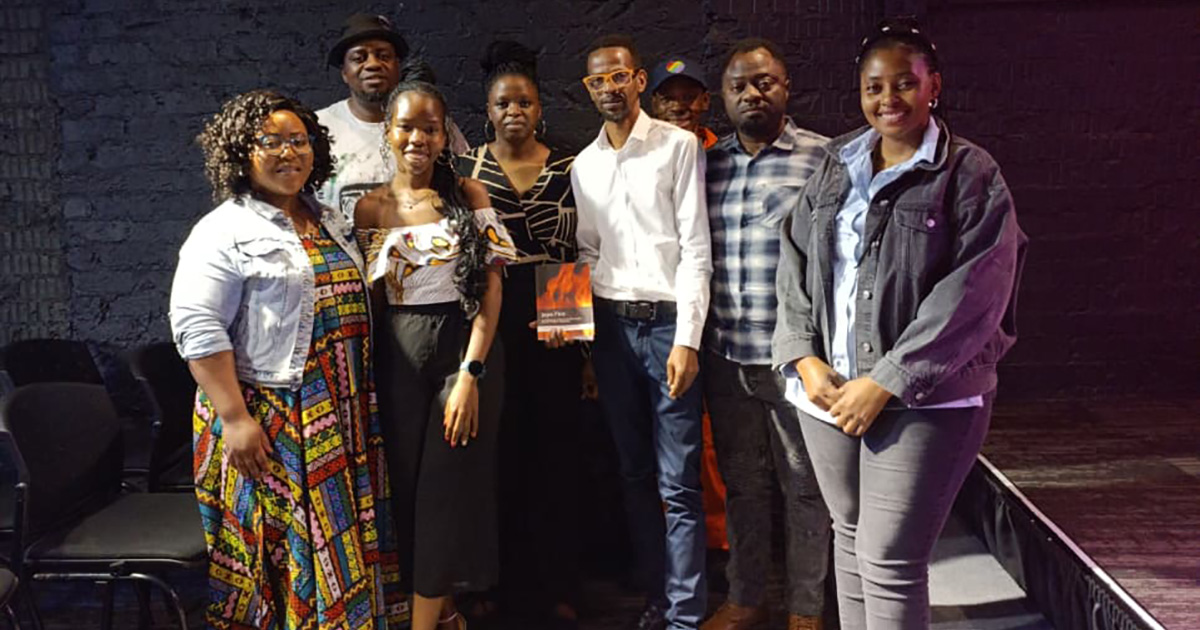On 5 September 2025, the Centre for Human Rights, Faculty of Law, University of Pretoria, attended the Johannesburg launch of Japa Fire: An Anthology of Poems on African and African Diasporic Migration, held at The Forge in Braamfontein. The event was organised by the Africa Migration Report Poetry Anthology Series, with the Centre invited to contribute to a panel discussion on migration, identity, and belonging.
Published by CivicLeicester in December 2024, Japa Fire brings together 63 poems by 20 poets, each offering unique perspectives on African and diasporic migration experiences. It is the first volume in the Africa Migration Report Poetry Anthology Series, inspired by the Africa Migration Report: Second Edition, produced by the African Union (AU) and the International Organization for Migration (IOM). The anthology takes its name from Japa Fire, a poem by Ayo Ayoola-Amale that reflects on Nigerian experiences of irregular migration.
CivicLeicester, the publisher, has a strong track record of amplifying refugee and immigrant voices. With Japa Fire, it presents a cultural companion to an official AU–IOM migration report, bridging research and lived experience through poetry.
Relevance in the current migration climate
Against the backdrop of rising displacement, restrictive migration policies, and ongoing debates about mobility across Africa and the diaspora, Japa Fire is both timely and necessary. The anthology reframes migration as more than a statistic or political challenge—it presents it as a human story of resilience, memory, and hope. In doing so, it contributes to reshaping public understanding of migration at a moment when inclusive and humane narratives are urgently needed.
Common themes: pride, identity, resilience, and belonging
Across its 63 poems, Japa Fire weaves together recurring themes of African pride, identity, resilience, and belonging. These voices challenge stereotypes and reclaim narratives of migration, transforming them from stories of loss into affirmations of dignity and strength. Tiffany MarSah’s West Africa and the Middle East portrays African womanhood as both nurturing and protective, while Nzingha Assata’s I Am Saying That I Am an Afrikan calls on readers to embrace African pride and consciousness with courage.
A platform for dialogue
The panel discussion featured Ms Omolara Asuni, Advisor at the South African Human Rights Commission, and Ms Molya Vundamina, Project Officer at the Migrants Unit, Centre for Human Rights, University of Pretoria. Their reflections framed the anthology within broader African migration contexts, drawing attention to how poetry can complement research and advocacy by amplifying lived experiences.
Discussions highlighted the importance of reclaiming African migration narratives, shifting them from accounts of loss and displacement to expressions of resilience, dignity, and community. The anthology, panelists observed, affirms the human dignity of migrants while celebrating African identity in all its richness and complexity.
Looking forward
The Johannesburg launch is part of a broader effort to use art and literature as tools to spark dialogue on migration. The Africa Migration Report Poetry Anthology Series intends to extend these conversations to universities, literary festivals, and community spaces, ensuring that migration remains central to both public and scholarly discourse.
Forced Migration and The Arts, together with CivicLeicester and Regularise, have issued an open call for poems for possible inclusion in the Africa Migration Report Poetry Anthology Series, a multi-year, multi-volume initiative publishing poetry collections on African migration. Writers are invited to submit work exploring personal, familial, community, and national histories and experiences of African and African diasporic migration.
By participating in the panel, the Centre for Human Rights reaffirmed its commitment to strengthening engagement on migration and human rights in Africa. The event demonstrated the power of poetry to connect personal experiences with wider social and policy issues, inspiring reflection, solidarity, and pride in African identity.



